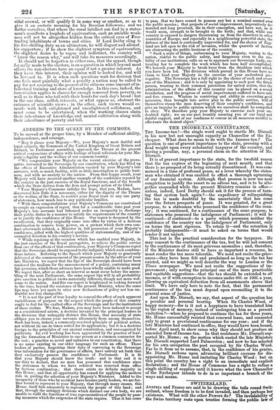THE INCOME-TAX CONTINUANCE.
THE Income-tax f—the single word ought to startle Mr. Disraeli in his new but not unsought capacity as Chancellor of the Ex- chequer. What does he mean to do with the Income-tax P The question is one of gravest importance to the state, pressing with a dead weight upon every substantial taxpayer of the country, and having a peculiar, nay, a personal claim on the attention of Mr. Disraeli.
It is of gravest importance to the state, for the twofold reason that the tax expires at the beginning of next month, and that there is no prospect of its being actually discontinued. It was com- menced in a time of profound peace as a lever whereby the states- man who obtained it was enabled peace, effect a thorough upturning of our financial system. Although that process is now too near completion to justify the resort to an odious tax, and is to be alto- gether suspended while the present Ministry remains in office— unless indeed, Lord Derby should ask it for the process of turn- ing that system back again ?—the expediency of relinquishing the tax is made doubtful by the uncertainty that has come over the future prospects of peace. It was granted, for a great purpose, to a statesman who possessed the confidence of the coun- try; it was continued, for a continuance of the same purpose to statesmen who possessed the indulgence of Parliament; it will! be continued—if continued—to a party which possesses neither the confidence of the country nor the indulgence of Parliament, only on terms the most rigorous. To retain it—and the retention is probably indispensable—it must be asked on terms that would. render it not unjust. This last is the practical consideration for the taxpayer. He may consent to the continuance of the tax, but he will not consent to the continuance of its most grievous anomalies ; and, therefore, if the Minister desires still to have so important a resource, he must render the tax more tolerable. We need not recite the griev- ances—they have been felt and proclaimed as long as the tax has existed, and we might as well describe the way to London or the Times newspaper. We need not recite the suggestions of im- provement; only noting the principal one of the more practicable and equitable suggestions—that the tax should be extended to all incomes, or if with exemption to incomes under 50/. or 100/. a year, allowing an equivalent deduction from all asseasments above that limit. We have only here to note the fact, that the permanent continuance of the tax must depend upon reconciling it to the general sense of justice.
And upon Mr. Disraeli, we say, that aspect of the question has a peculiar and personal bearing. When Sir Charles Wood, of happy memory—for is it not a happiness to have translated him to the region of memory, instead of undergoing him as a present visitation ?—when he proposed to continue the tax for three years, Mr. Hume successfully resisted that renewed lease, and consented only to grant a provisional continuance for one year; and if the late Ministers had continued in office, they would have been bound, before April next, to show cause why they should not produce an amended form of Income-tax. In that resistance Mr. Disraeli sup- ported Mr. Hume ; on the motion which ousted the late Ministers Mr. Disraeli supported Lord Palmerston • and now he has selected for his own occupation the post occupied by Sir Charles Wood. Far best from us to assume, that, in the confidence of his genius, Mr. Disraeli reckons upon advancing brilliant excuses for dis- appointing Mr. Hume and imitating Sir Charles Wood : but on this point the country has a right to an immediate and explicit declaration; and the House of Commons has a right to refuse a single shilling of supplies until it knows what the new Chancellor of the Exchequer intends to do in so important a branch of the ways and means.


























 Previous page
Previous page